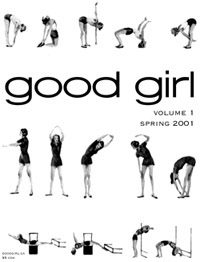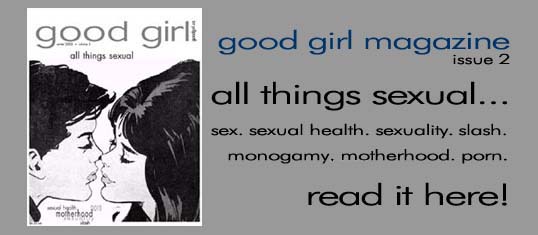 |
| Good
Girl! An
interview with Nikko Snyder |
||
 |
||
  |
Can
you tell me first of all a little bit about yourself? How old are you,
where are you originally from and where do you reside now?
What
do you do besides your zine?
|
|
Bringing together a board is one of the best steps that good girl has taken. I think having a group of people working together ensures that a variety of perspectives and questions are raised about everything. It's challenged me (and everyone else, I hope) to think hard about what the purpose of goodgirl is, and how we want to help the project fulfil its potential.
What
made you decide to start this project? How didyou come up with the idea
and the name? I chose the name good girl because it seemed universal somehow. Not universal in the sense that all women will relate to it in the same way, but in the sense that a lot of women have experience with an idea of what a 'good girl' is. Whether their experience is good or bad, rooted in family or age or racism or whatever, I loved that it could spark people. Whether it makes them mad or laugh or think it's ironic, I hope that people can use this one phrase and whatever it means to them, and use it to jump into dialogue with other women. What
topics are most often discussed in your zine? |
|
|

|
|
| What
do you hope to accomplish by establishing your zine? At the same time, I don't think that good girl is specific only to Canada - I think it's just as beneficial for Americans to read perspectives other than their own, so I would like good girl to reach American readers. What
does zine making (and reading) mean to you? What do you love about zine
making? What is the most challenging aspect of making zines? What
was your first exposure to zines? How did you find out about them? What
have they come to mean to you? Do
you consider grrrl zines as an important part of a movement of sorts?
Do you think zines can effect meaningful social and political change? At
the same time, I think that zine culture has its limitations, and I
think it's important for zine makers and readers to stay conscious about
what these are. I think we need to be careful not to get stuck in our
own worlds and heads, but instead keep reaching out to other people
doing other stuff, pushing the boundaries, and pushing our own boundaries.
good girl has been about busting down my own boundaries and encouraging
others to do the same. It's all about continuing to make connections,
communicate across difference - that's why I think a project like grrrlzines.net
is so important! |
|
 |
|
| What
advice would you give others who want to start a zine? What
are the most pressing issues you are confronted with in daily life (as
a woman/feminist)? Are
you active in the feminist movement? What
do you think about feminism today? Do you see yourself as part of Third
Wave Feminism and what does it mean to you? The word feminism is a huge challenge in and of itself, and I think that's another huge challenge in the so-called 'Third Wave Feminist' movement. There are plenty of women out there who may not identify with the word feminism, for any number of totally valid reasons. So how do you use the word feminism without alienating people? I'm struggling with that a lot in good girl.
At the same time, I can't imagine the Internet taking over real books, zines etc. I could never read a book online, and I barely ever read anything off the Internet, unless I have to. I totally appreciate the work of the countless awesome online zines and projects, but I'd way rather sit down with a real magazine or book, get it all ratty and worn. That's why good girl is a print mag, even though it's so much less affordable.
|
|
|
|
|
| copyright of images by Good Girl Magazine 2002
|
|

